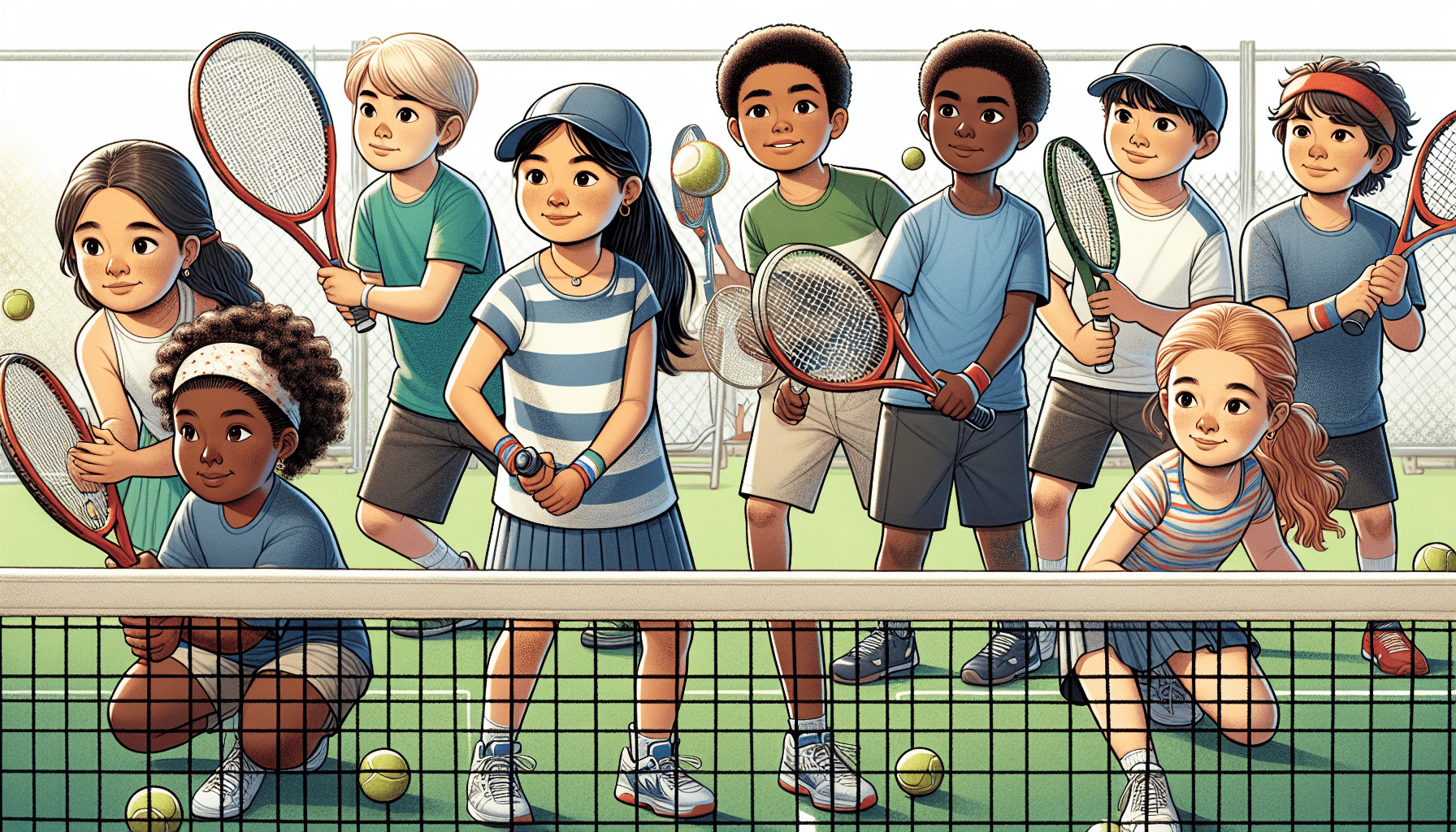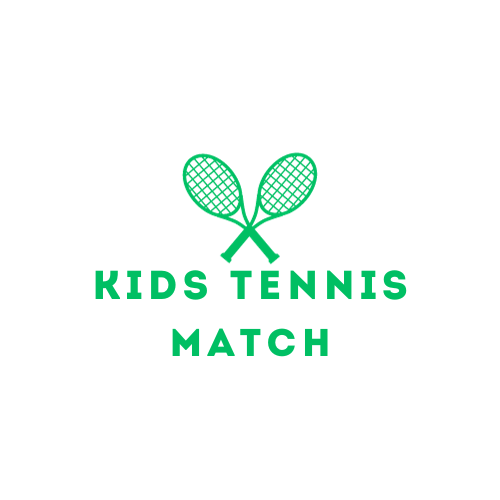Can 9-year-olds play tennis? The answer is a resounding yes! Tennis is a fantastic sport that can be enjoyed by children of all ages, including 9-year-olds. Not only does it provide a fun and active way for kids to spend their time, but it also helps develop their hand-eye coordination, agility, and overall fitness. So if you have a 9-year-old who is interested in tennis, go ahead and encourage them to give it a try – they might discover a lifelong passion!
Physical Development
Motor skills
Playing tennis at a young age can greatly contribute to the development of motor skills in 9-year-olds. The sport involves running, hitting the ball, and coordinating hand-eye movements. By participating in regular tennis practice, children can improve their agility, balance, and overall coordination.
Flexibility
Flexibility is another key aspect of physical development that can be enhanced through tennis. The movements required in tennis, such as reaching for the ball and performing various strokes, require a good range of motion in the joints. Regular stretching exercises before and after playing tennis can promote flexibility and reduce the risk of injuries.
Strength
Tennis also helps in building strength in 9-year-olds. The sport involves repetitive movements that require the muscles to exert force. By engaging in activities like hitting the ball and moving around the court, children can strengthen their muscles, particularly in the arms, legs, and core.
Mental Development
Concentration
Playing tennis requires concentration and focus, which can greatly contribute to the mental development of 9-year-olds. In order to return the ball accurately and effectively, children need to pay attention to the trajectory, speed, and positioning of the ball. Developing concentration skills through tennis can also have positive effects on other areas of their lives, such as academics.
Patience
Patience is a virtue that can be cultivated through playing tennis. The sport often involves long rallies and strategic gameplay, requiring children to be patient and wait for the right opportunity to make their move. Learning to be patient on the tennis court can help children develop patience and resilience in other aspects of their lives as well.
Strategy
Tennis is not just about hitting the ball back and forth; it also requires strategic thinking. 9-year-olds can learn to analyze their opponent’s weaknesses, exploit their own strengths, and adapt their gameplay accordingly. This strategic aspect of tennis helps in honing problem-solving skills and critical thinking abilities.

Equipment
Rackets
A suitable racket is essential for 9-year-olds to play tennis comfortably. It is important to choose a racket that is appropriate for their age and size. Junior rackets are designed with smaller grip sizes and lighter weights, making them easier for young players to handle.
Balls
Tennis balls for 9-year-olds are typically softer and slower than standard tennis balls. These balls are easier to hit, allowing young players to practice their strokes with better accuracy. Opting for low-compression or foam balls can contribute to a positive learning experience for children.
Net
A net is a necessary component of a tennis court, separating the two sides and defining the playing area. For 9-year-olds, a lower net height is often recommended to allow them to clear the net easily. This facilitates successful rallies and encourages a sense of achievement in young players.
Safety Considerations
Protective gear
It is important to prioritize safety when 9-year-olds play tennis. Protective gear like wristbands and sweatbands can help absorb sweat and prevent slipping during intense gameplay. Additionally, proper tennis shoes provide support and stability, reducing the risk of injuries to the feet and ankles.
Supervision
While 9-year-olds can start playing tennis independently, it is still crucial to have adult supervision, especially for younger or less experienced players. Supervision ensures that children follow the rules of the game, maintain proper etiquette, and stay safe on the court.
Court conditions
Ensuring safe court conditions is essential for 9-year-olds to play tennis without the risk of accidents. Regular maintenance, such as removing debris and inspecting the court for any hazards, should be conducted to create a safe and enjoyable environment for young players.

Training and Coaching
Basic techniques
Proper training and coaching are instrumental in helping 9-year-olds learn the basic techniques of tennis. Qualified coaches can teach children the correct grip, footwork, and swing techniques for different strokes. Mastering these fundamental skills sets a strong foundation for further development in the sport.
Drills
Drills are an effective way to improve specific aspects of tennis skills. For 9-year-olds, drills can focus on developing movement patterns, hand-eye coordination, and shot accuracy. Regular practicing of drills helps children refine their techniques and build muscle memory.
Gameplay
As 9-year-olds progress in their tennis journey, participating in actual gameplay becomes crucial for their development. Regular practice matches and friendly competitions allow young players to apply their skills in context, reinforce their understanding of tactics, and experience the challenges and rewards of competitive tennis.
Benefits of Playing Tennis
Physical fitness
Playing tennis offers numerous physical fitness benefits for 9-year-olds. The sport provides a full-body workout, improving cardiovascular fitness, muscular endurance, and overall strength. Regular tennis practice can also contribute to weight management and promote a healthy lifestyle.
Motor skill development
Tennis is a wonderful sport for enhancing motor skills in 9-year-olds. The complex movements involved in hitting the ball, running, and changing direction help improve coordination, balance, and agility. The repetitive nature of the sport enables young players to develop muscle control and refine their fine motor skills.
Social interaction
Participating in tennis allows 9-year-olds to engage in social interaction with their peers. Whether it’s practicing together, playing doubles matches, or competing in tournaments, tennis provides an opportunity for children to make new friends, develop teamwork skills, and learn good sportsmanship.
Age-Appropriate Competitions
Mini tennis tournaments
Mini tennis tournaments are specifically designed for young players, including 9-year-olds. These tournaments have modified rules, equipment, and court sizes, creating a more suitable and enjoyable environment for young players to showcase their skills and gain competitive experience.
Local club competitions
Local tennis clubs often organize competitions for players of different age groups. These friendly competitions provide 9-year-olds with an opportunity to test their skills against other players from the community. Participating in club competitions can help young players develop confidence and a sense of achievement.
Friendly matches
Friendly matches can also be organized between 9-year-olds to foster a spirit of healthy competition and encourage continuous improvement. These matches can be informal, exchanged between friends or within tennis programs, providing a supportive environment for young players to learn, grow, and have fun.
Parental Involvement and Support
Enrollment in tennis programs
Parents can support their 9-year-olds by enrolling them in tennis programs tailored for their age group. These programs provide structured training, personalized coaching, and opportunities for social interaction. Enrolling in such programs allows children to receive guidance from experienced coaches and progress at an appropriate pace.
Watching and cheering
Parents can actively support and motivate their 9-year-olds by regularly attending their tennis practices and matches. Watching their child play and cheering them on provides encouragement and fosters a sense of pride. This parental involvement helps create a positive and supportive atmosphere for young players.
Encouragement
Positive reinforcement and encouragement are crucial for 9-year-olds to overcome challenges and stay motivated. Parents can offer praise for their child’s efforts and progress, emphasizing the importance of enjoying the sport rather than focusing solely on winning. Encouragement helps build confidence and resilience in young players.
Overcoming Challenges
Frustration
In the face of challenges or setbacks, 9-year-olds may experience frustration while playing tennis. It is important to teach them how to handle and overcome this frustration by emphasizing the importance of perseverance, a growth mindset, and learning from mistakes. Encouraging a positive attitude towards challenges can help children develop resilience and determination.
Losses
Losing is a natural part of any sport, including tennis. Parents, coaches, and players should remember that the primary goal for 9-year-olds is to enjoy the game and learn from their experiences. After a loss, it is important to provide support, highlight areas of improvement, and reinforce the value of sportsmanship and fair play.
Injury prevention
Taking proactive measures to prevent injuries is essential when 9-year-olds play tennis. Ensuring proper warm-up and cool-down routines, encouraging regular stretching exercises, and providing guidance on correct technique and form can significantly reduce the risk of injuries. Parents and coaches must prioritize the safety and well-being of young players.
Conclusion
Playing tennis at the age of 9 can have numerous developmental benefits both physically and mentally. It enhances motor skills, improves concentration and patience, and fosters strategic thinking. With appropriate equipment, safety considerations, and training, 9-year-olds can participate in age-appropriate competitions and experience the rewards of playing tennis. Parental involvement and support play a vital role in nurturing a child’s passion for the game and helping them overcome challenges. By engaging in tennis, young players can develop physically, mentally, and socially while creating lifelong memories on the court.
